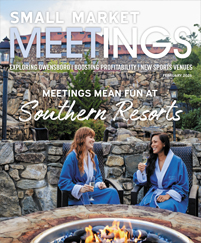
The economic landslide might have an upside for religious meetings.
“While every market has certainly seen the effects of a difficult economy, this can sometimes create opportunities for religious groups,” said Drew McCauley, national sales manager for the Providence-Warwick (R.I.) Convention and Visitors Bureau. “When the economy turned and rates dropped in first- and second-tier cities, it opened a wide range of destinations and venues that were historically too expensive.”
Joshua Townsend agrees. He’s director of state and national accounts for the Little Rock (Ark.) CVB and a member of the Religious Conference Management Association (RCMA) board of directors.
“The faith-based market has always been very budget-conscious in any economic climate,” said Townsend. “The recession was more beneficial to faith-based groups in that they had greater negotiating power with hotels.”
A number of cities are seeing faith-based business grow as a result. Providence, for example, recently booked the largest religious conference in its history, the Unitarian Universalist Association General Assembly for 2014.
San Jose, known for its tech firms, has grown its religious meeting segment by 55 percent in terms of number of events and 33 percent in terms of room nights in the past three years, according to Diana Ponton, vice president of sales and marketing for Team San Jose.
“For 2010 to 2013, San Jose is hosting 13 events with a religious focus,” said Ponton.
Smaller cities are also seeing growth.
“Over the last four months, we are seeing more interest from groups that are faith-based,” said Erin Schmitz, director of convention sales for the Waterloo (Iowa) CVB.
In Frisco, Texas, four major religious organizations have booked conferences recently.
“Frisco has seen a tremendous amount of growth in this market since fiscal year 2010,” said Maureen Gutierrez, sales manager for the Frisco CVB. “We have been selected by the Jehovah Witness, Catholic Diocese, Seventh-Day Adventist and Southern Baptist Convention of Texas, all within the last nine months.”
Of course, faith-based groups might get a different reception as the market recovers and prices start to rise.
“As the economy improves, so does the corporate segment and typically hotel rates rise,” said Ponton. She predicts many larger, more expensive cities that have recently pursued religious meetings will become less accessible to them.
She says her city though, has come to realize the value of a diversified mix of meeting business. As the Silicon Valley’s unofficial capital and the home of many tech companies, “obviously corporate is a strong segment for us,” she said. “but the religious market is just as valued.”
Here are other insights from Gutierrez (Frisco CVB), McCauley (Providence-Warwick CVB) Ponton, (Team San Jose); Schmitz (Waterloo CVB) and Townsend (Little Rock CVB).












